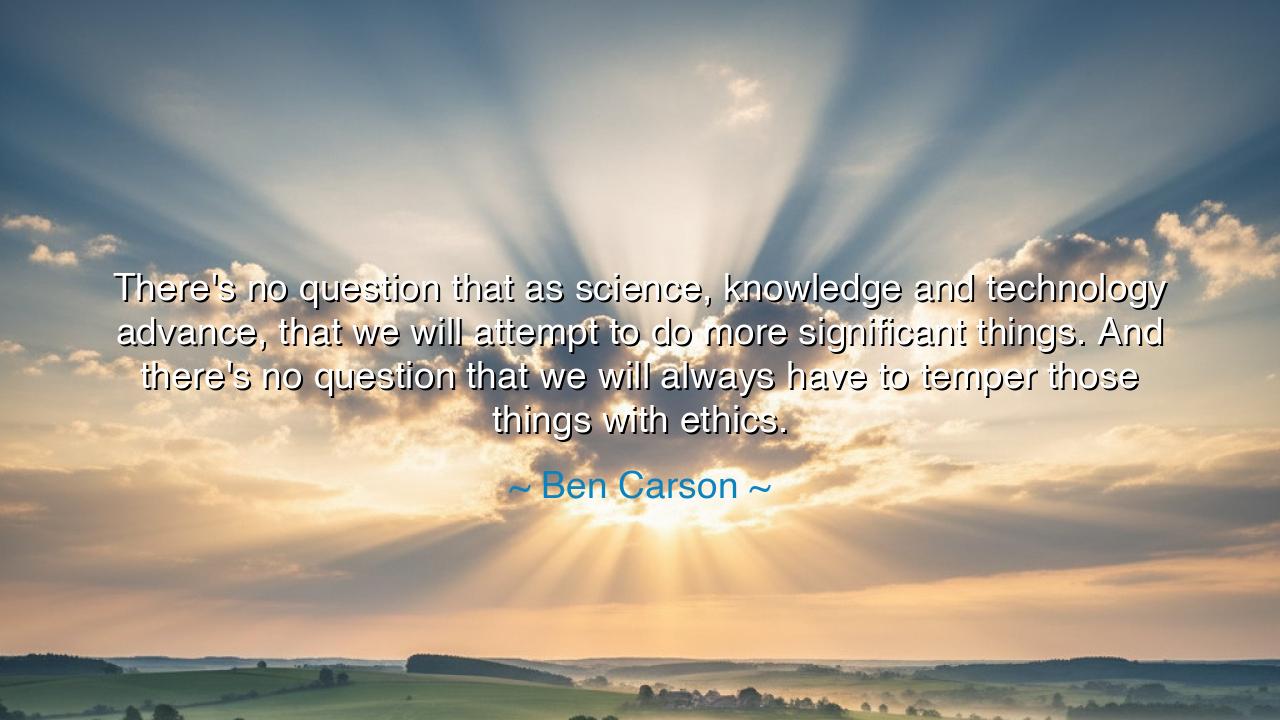
There's no question that as science, knowledge and technology
There's no question that as science, knowledge and technology advance, that we will attempt to do more significant things. And there's no question that we will always have to temper those things with ethics.






Hear, O seekers of wisdom, the words of Ben Carson, healer of the body and teacher of the soul, who declared: “There’s no question that as science, knowledge, and technology advance, we will attempt to do more significant things. And there’s no question that we will always have to temper those things with ethics.” These words rise as both prophecy and warning. For they remind us that the march of progress is relentless, but unless it is guided by conscience, the gifts of discovery may become instruments of destruction.
The origin of this saying lies in Carson’s life as a pioneering neurosurgeon, one who dared to attempt procedures many thought impossible. He saw firsthand how science and technology open doors that once seemed forever locked. But he also knew that not every door should be opened, and not every possibility should be pursued. What guards humanity from ruin is not merely brilliance of mind, but the anchor of ethics—that wisdom which asks not only can we do this? but should we do this?
Consider, O listener, the story of the Manhattan Project. Out of the brilliance of physicists came the splitting of the atom, and with it, immense power. They accomplished what the ancients would have thought the work of gods: to release the fire at the heart of matter. Yet without the guidance of ethics, that gift became a weapon that consumed Hiroshima and Nagasaki in flame. Here is Carson’s truth unveiled: progress must walk hand in hand with conscience, else it devours those who create it.
Or reflect on the tale of medical science. The advances of surgery, vaccines, and medicine have saved millions of lives. But history also records darker chapters: experiments without consent, abuses in the name of discovery, lives sacrificed for the illusion of progress. Where knowledge was not tempered by ethics, science betrayed its purpose and turned against the very people it was meant to serve. From such lessons, humanity learns that greatness without morality is but ruin in disguise.
Thus Carson’s words remind us of a sacred balance. Science investigates, technology creates, knowledge empowers—but ethics restrains and directs. Without ethics, power is like a wild horse, galloping into chaos. With ethics, power becomes a disciplined steed, carrying humanity toward justice, compassion, and truth. Progress alone is not victory; progress guided by moral vision is the true triumph.
The lesson is plain: in your own life, as in the life of nations, do not pursue ability without purpose, nor power without principle. In every choice, ask not only what you are able to do, but what you ought to do. Seek advancement, yes, but let it be tempered with humility, with justice, and with concern for the good of others. For the worth of progress is not measured in what it builds, but in whom it serves.
Practical actions lie close at hand. If you are a student, seek knowledge, but also cultivate character. If you are a worker, master your craft, but also ask how your work blesses others. If you are a leader, pursue innovation, but bind it to compassion and fairness. Teach children not only to dream boldly, but to choose wisely. For only when ethics walks beside science will the path of progress lead not into ruin, but into a future radiant with hope.
So let Ben Carson’s words echo within you: humanity will always reach higher, will always attempt more. That cannot be stopped. But whether these attempts become blessings or curses rests on one thing alone—the courage to temper power with ethics. Let knowledge be your sword, let ethics be your shield, and you will walk not only in greatness, but in goodness.






AAdministratorAdministrator
Welcome, honored guests. Please leave a comment, we will respond soon